People > Alexander III the Great
Alexander III the Great

Background
Alexander III the Great was probably the best battlefield commander and military genius of the ancient era. Coming from the northern Greek state of Macedon, he was able to conquer, subdue and unify all of Greek city-states before turning his forces towards the age old enemy the Achaemenid Empire under the leadership presently of Darius III. Following his highly successful Balkan Campaign he would move on to launch a land invasion of Asia known as the Persian Campaign, Alexander ended up conquering nearly all of the known world at that time and forging an empire from Greece all the way to India.
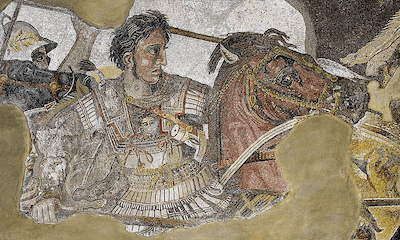
Alexander the Great Mosaic
In the process he amassed an empire and territory the world had never seen before and throughout the ensuing Hellenistic Period the many various cultures in the empire would diffuse and mix allowing for the massive transmission of ideas, technology, goods and much more. Throughout his life Alexander influenced either indirectly or directly nearly every major civilization, city and event in his time. His influence was also felt several hundred and perhaps thousands of years after his death. His contribution to the development of modern history cannot be stated enough.
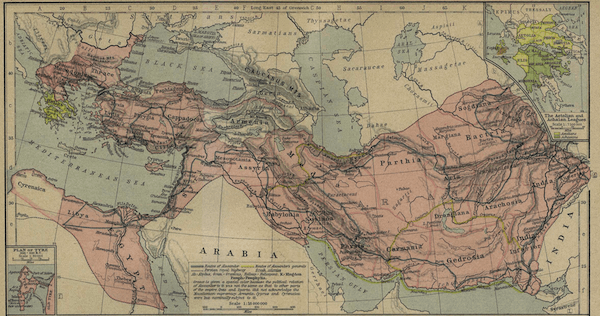
Alexanders Empire (336-323 BCE) Historical Atlas (1923)
After establishing his empire he set out to build strategic cities that would enable this new Hellenistic Empire to rule for thousands of years of peace and prosperity. However, he would never live to see his dream be carried out as he died very early in his life, under very mysterious circumstances. In fact, out of any ancient person discussed, Alexander the Great boasts more mysteries than any other person.
What is known that upon his death in Babylon in 323 BCE his successors and generals waged a massive series of wars known as the Wars of the Diadochi that carved out his empire into their own personal kingdoms. The Wars of the Diadochi broke Alexander's empire into three to four various empires that would persist until being crushed by the Roman and Parthian Empires. Most of what we know about Alexander the Great comes from four major historians written several hundred years after his death. They based their histories on the journals of those who had fought besides Alexander and are the only real link we have at these documents as many appear destroyed. These historians are Arrian of Nicomedia, Diodorus Siculus, Quintus Marcius Rufus and Plutarch.
Early Years
Alexander was born to King Philip II of Macedon and his wife Olympius in the capital Pella on the sixth day of the Greek month of Hekatombaion. According to our modern calendar that is about 356 BCE but we do not have the exact date. Alexander was born while his father was away campaigning and he spent his early years under the guidance of a nurse named Lanike who was the sister of Alexander's future general Cleitus the Black.
Being the son of the king, he was raised in many aspects of royalty such as reading, writing, fighting, hunting and playing the lyre. One of the stories of Alexander's youth follows that when he was ten a merchant from Thessaly brought Philip a horse later named Bucephalas that he was trying to sell for thirteen talents. The horse refused to be mounted however, Alexander apparently noticed it was scared of its own shadow and asked to try to tame the horse.
He was successful to which his father replied he better find a kingdom big enough for his ambitions. In fact, this horse was to stay with Alexander all through his campaign and eventually die of old age in India. When the horse died, Alexander named a city in its honor known as Alexandria Bucephalous.
Olympius
See Olympius
Olympius was always concerned with getting her son Alexander to the throne and establishing a dynasty.
Aristotle
See Aristotle
When Alexander turned thirteen, Philip searched all over Greece for the best tutor for his son. He eventually settled on Aristotle and gave him the Temple of the Nymphs to use as a school. This was a massive garden temple located in Macedon perfect for the great philosopher to teach his young students. In return for Aristotle doing this Philip would rebuild his hometown of Stageira and buying all his people who were sold into slavery or exiled. Philip had destroyed it during one of his previous campaigns.
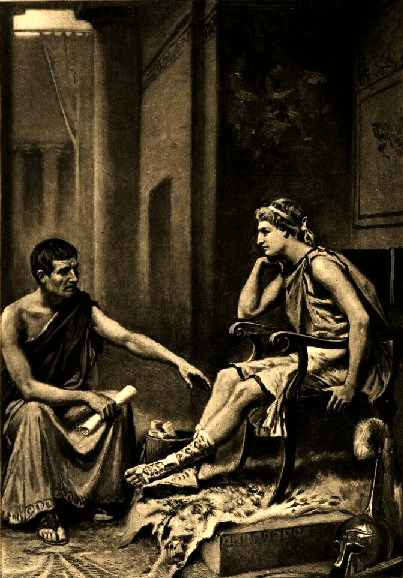
Aristotle Tutoring Alexander - J.L.G Ferris (1895)
Aristotle agreed and eventually the Temple of Nymphs grew to include other of his future companions (officers and generals) such as Ptolemy I and Cassander. Many of these kids that would learn with Alexander would later grow up to become his generals and through Aristotle they learned about philosophy, medicine, religion, morals, logic and art. Through Aristotle Alexander developed a great passion for the works of Homer and especially liked the Iliad, even keeping a copy with him during his military campaigns.
Becoming King
Alexander became king of Macedon at the age of twenty in the summer of 336 BCE. While at the wedding of his daughter Cleopatra to Olympias' brother Alexander I of Epirus, king Philip II of Macedon was assassinated by the captain of his guard named Pausanias. When Pausanias tried to escape he tried over a vine and was killed by two of Alexanders people named Perdiccas and Leonnatus. While Alexander was proclaimed king by the nobles and the army he still had to make sure there were no family members who wanted to threaten his rule. He had his cousin named Amyntas IV executed along with two Macedonian princes from Lyncestis.
When the rest of the Greek city-states such as Athens, Thebes, along with Thessaly and the Thracian tribes to the north heard of Philips death they revolted. It was up to Alexander to immediately put down these internal conflicts before he was able to expand upon the empire his father had started to build.
Alexander the Great's Campaign
See Alexander the Great's Campaign
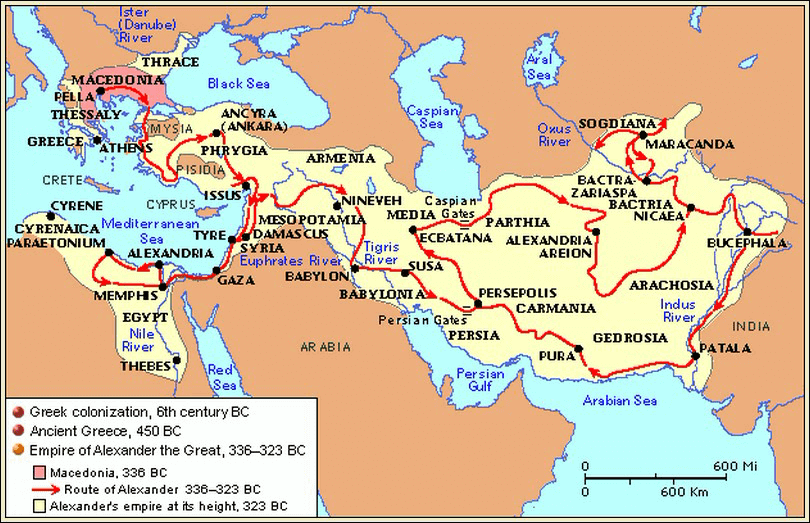
Alexander's Military Campaign - Alexander the Great (1848)
Alexander's Balkan Campaign
See Alexander's Balkan Campaign
After securing the mainland of Greece under his control, Alexander moved to launch one of the largest and longest military campaigns in all of ancient history. Hoping to cross into Asia and push back the Persian Empire, Alexander and his army ended up doing much more than that, with the eventual conquering of all Asia.
Alexander's Persian Campaign
See Alexander's Persian Campaign
Battle of the Granicus
Battle of Issus
See Battle of Issus
Battle of Guagamela
Siege of Tyre
See Siege of Tyre
It was now decided among Alexander's top generals that they would hold off on any potential Persian invasion while the city of Tyre remain free and independent. Conquering this city-state would add a much needed maritime capacity to Alexanders ground based military force.
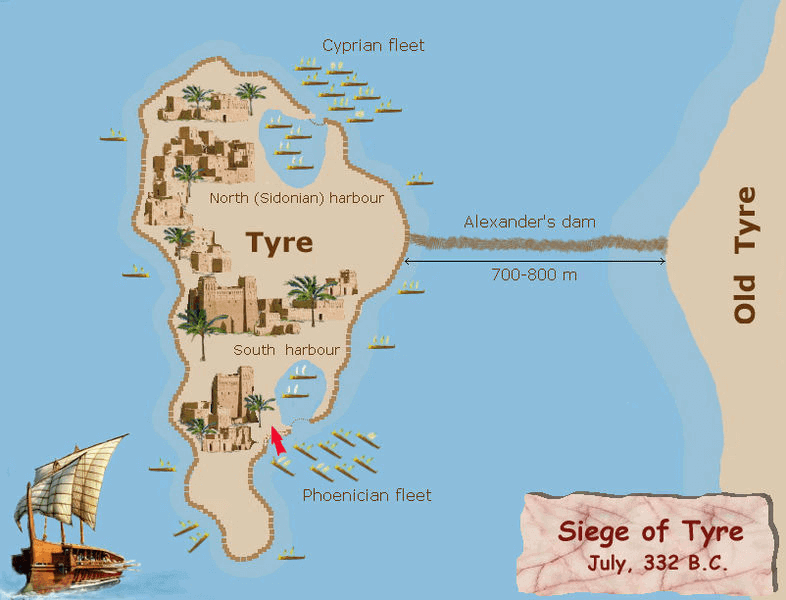
Alexander's Siege of Tyre 332 BC Plan
In one of the most strategic actions of the ancient era, Alexander literally built a bridge to the island city and conquered it. You can read more about the Siege of Tyre here. After conquering the city of Tyre and the Phoenicians, Alexander was ready to move into the satrapy of Egypt.
Egypt
See Alexander the Great in Egypt
Babylon
See Babylon
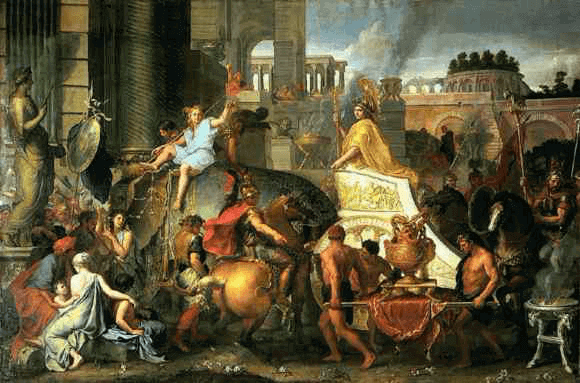
Alexander in Babylon - Charles le Brun (1665)
Persepolis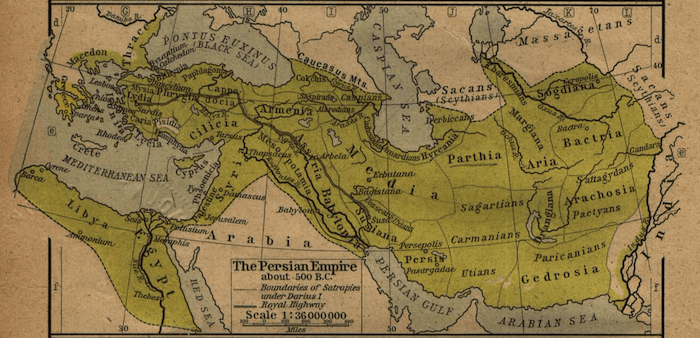
Achaemenid Empire (500 BCE) - Historical Atlas (1923)
Alexander's Indian Campaign
Battle of the Hydaspes

Alexanders Empire (336-323 BCE) Historical Atlas (1923)
Returning Home
Death
See Death of Alexander the Great
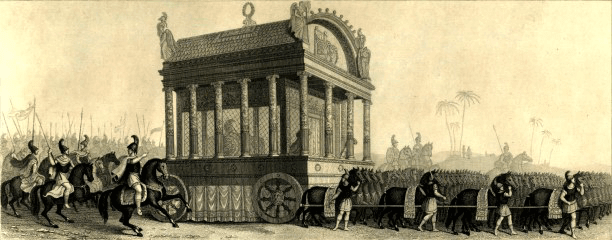
Alexander the Great Funeral Procession
The death of Alexander the Great is one of the ancient worlds greatest mysteries.
Legacy
Wars of the Diadochi
In the aftermath of Alexander's untimely death a series of wars broke out in a power struggle that would last over forty years between Alexander's former friends and generals. Known as the Wars of the Diadochi, they fought to maintain control over various sections of the empire as Alexander left no legitimate male heir. These bloody wars were merely a continuation of Alexander's bloody conquest, it seemed this was all these men had ever known. In the end the result was three major kingdoms that would continue to expand Greek civilization throughout the ancient world.
Macedon King List
Macedon King List
Sources
Primary Sources
Secondary Sources
Abbott, J. (1848). Alexander the Great. New York & London: Harper & Brothers
Alexander the Great By Philip Freeman